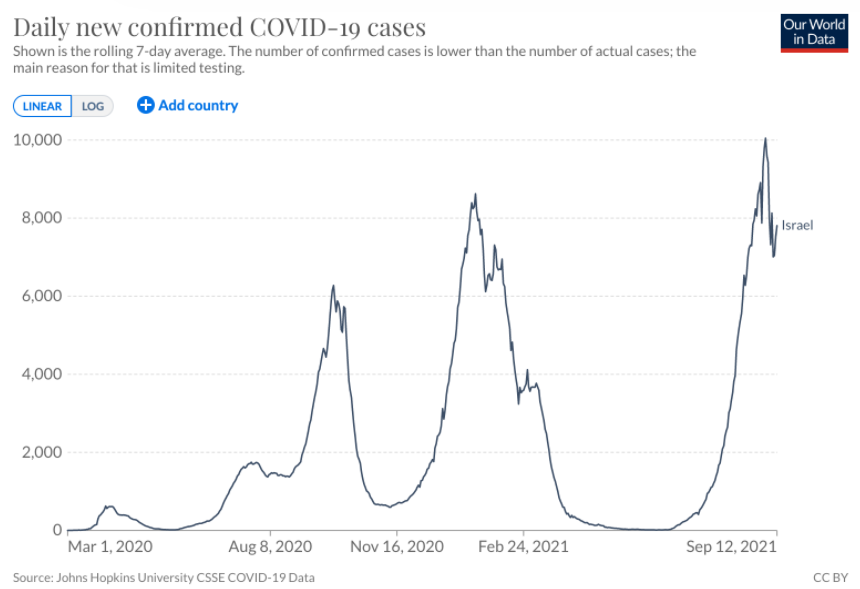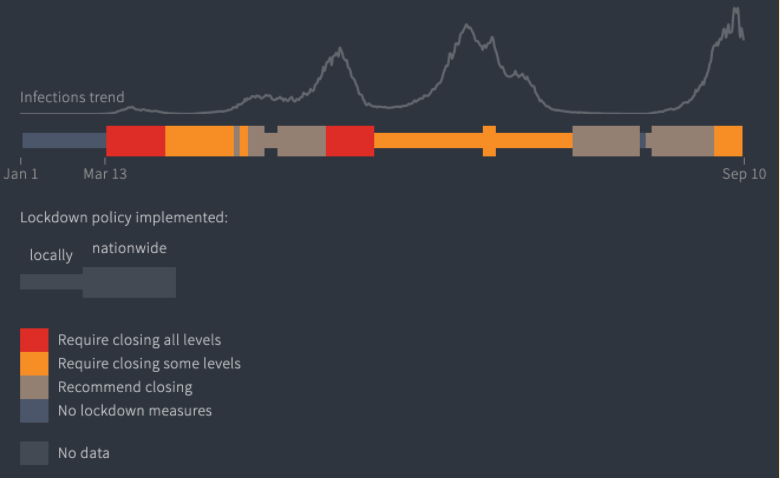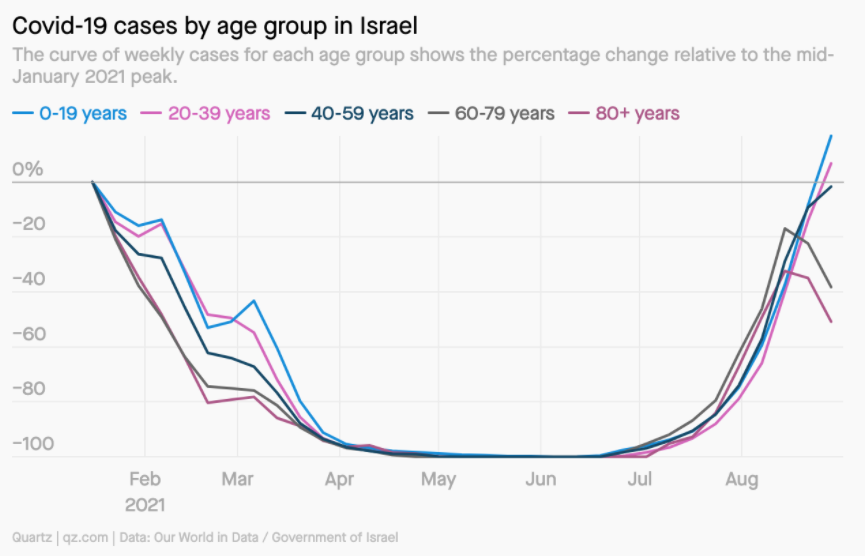Israel: A Model or the “World’s Laboratory”?
September 29, 2021
By Ryan M. Thomas
At Eyam’s Annual General Meeting of Shareholders in June, I expressed concern about the rising cases in Israel. Israel was a model for the world, having rolled out the fastest, most well organized vaccination program in the world. In short order, Israel was one of the fastest countries to vaccinate 80% of their adult population. It was so effective, that cases dropped from 10,000 per day down to as few as 10 per day in early June. We sounded the alarm at the end of June when cases rose above 100 per day. A few months later, the Delta Variant brought cases back to January highs, reaching 10,000 per day again.

This month, Israel has seen testing sites overrun with some people waiting as long as 3 hours to be tested. Large numbers of students were required to test negative before returning to school. As a consequence, many gave up and chose not to return to work or school. Two weeks ago, the Health Ministry said more than 100,000 children and teens were quarantined after coming into contact with a confirmed COVID case, while more than 40,000 children had recently been infected.
The R-value, the reproductive rate of the virus measuring the average number of people each positive person infects, briefly dropped to 0.83, the lowest recorded number since May, but is now back up above 1, puzzling Israeli scientists who were hopeful that a rapid rollout of booster shots would blunt the Delta Wave.
So, what happened?
In May, Israel chose to relax COVID restrictions thinking that victory was in their grasp. Mask mandates were relaxed, travel restrictions were lifted and life returned to normal – for two months.

We’ve since learned from data out of Israel that vaccine effectiveness in preventing infection drops significantly after 5 months. While vaccines still reduced hospitalizations and death, that protection also begins to wane after 7 months.
With the arrival of the Delta Variant, and children returning to school, a perfect storm arrived in Israel.
What was hailed as a model for the world, became a lesson for the world.
A “Laboratory for the World”
Last week, Philip Dormitzer, Pfizer’s Chief Scientific Officer shared, “Early in the pandemic we established a relationship with the Israeli Ministry of Health where they used exclusively the Pfizer vaccine and then monitored it very closely so we had a sort of laboratory where we could see the effect.” Later adding that Israel “immunized a very high proportion of the population very early — so it’s been a way that we can almost look ahead: What we see happening in Israel happens again in the US a couple months later.”
Dormitzer received harsh criticism for referring to Israel as a laboratory. Yet, his comments are important to understand where we are at in the pandemic and how vaccine efficacy wanes over time.
In August, Israeli Prime Minister Bennett met with President Biden and warned him not to repeat Israel’s mistakes. Shortly after the meeting, Biden spoke with the media saying that he was considering a third booster shot to be administered after 5 months to prevent another severe wave.
More Boosters
In July, after it was becoming clear that children were getting infected at record levels and vaccine effectiveness had waned, the Israeli Ministry of Health quickly authorized a third booster shot to be distributed.

While early data shows that a third booster shot strengthens vaccine effectiveness, many scientists remain concerned that it is a short term solution that could lead to increased adverse side effects and is unsustainable to be able to inoculate 7+ billion people.
Israel seems to have learned their lesson and is already stockpiling vaccines, in preparation for the need to administer a 4th booster shot as early as the beginning of 2022.
Lessons for the World
Israel’s summer surge shows the world what to expect with vaccine immunity and the effect of the emergence of new variants. Most countries have had greater challenges with their vaccine rollout and have been slower to vaccinate than Israel. The dramatic drop in vaccine effectiveness affected Israel in a way that is unlikely to affect countries that vaccinated their populations over several months.
As policy advisors and media pundits come to terms with the short term effectiveness of first-generation vaccines, the solution to the pandemic remains the same: wide distribution of sterilizing vaccines that stop transmission and prevent infection.
Israel: A Model or the “World’s Laboratory”?
September 29, 2021
By Ryan M. Thomas
At Eyam’s Annual General Meeting of Shareholders in June, I expressed concern about the rising cases in Israel. Israel was a model for the world, having rolled out the fastest, most well organized vaccination program in the world. In short order, Israel was one of the fastest countries to vaccinate 80% of their adult population. It was so effective, that cases dropped from 10,000 per day down to as few as 10 per day in early June. We sounded the alarm at the end of June when cases rose above 100 per day. A few months later, the Delta Variant brought cases back to January highs, reaching 10,000 per day again.

This month, Israel has seen testing sites overrun with some people waiting as long as 3 hours to be tested. Large numbers of students were required to test negative before returning to school. As a consequence, many gave up and chose not to return to work or school. Two weeks ago, the Health Ministry said more than 100,000 children and teens were quarantined after coming into contact with a confirmed COVID case, while more than 40,000 children had recently been infected.
The R-value, the reproductive rate of the virus measuring the average number of people each positive person infects, briefly dropped to 0.83, the lowest recorded number since May, but is now back up above 1, puzzling Israeli scientists who were hopeful that a rapid rollout of booster shots would blunt the Delta Wave.
So, what happened?
In May, Israel chose to relax COVID restrictions thinking that victory was in their grasp. Mask mandates were relaxed, travel restrictions were lifted and life returned to normal – for two months.

We’ve since learned from data out of Israel that vaccine effectiveness in preventing infection drops significantly after 5 months. While vaccines still reduced hospitalizations and death, that protection also begins to wane after 7 months.
With the arrival of the Delta Variant, and children returning to school, a perfect storm arrived in Israel.
What was hailed as a model for the world, became a lesson for the world.
A “Laboratory for the World”
Last week, Philip Dormitzer, Pfizer’s Chief Scientific Officer shared, “Early in the pandemic we established a relationship with the Israeli Ministry of Health where they used exclusively the Pfizer vaccine and then monitored it very closely so we had a sort of laboratory where we could see the effect.” Later adding that Israel “immunized a very high proportion of the population very early — so it’s been a way that we can almost look ahead: What we see happening in Israel happens again in the US a couple months later.”
Dormitzer received harsh criticism for referring to Israel as a laboratory. Yet, his comments are important to understand where we are at in the pandemic and how vaccine efficacy wanes over time.
In August, Israeli Prime Minister Bennett met with President Biden and warned him not to repeat Israel’s mistakes. Shortly after the meeting, Biden spoke with the media saying that he was considering a third booster shot to be administered after 5 months to prevent another severe wave.
More Boosters
In July, after it was becoming clear that children were getting infected at record levels and vaccine effectiveness had waned, the Israeli Ministry of Health quickly authorized a third booster shot to be distributed.

While early data shows that a third booster shot strengthens vaccine effectiveness, many scientists remain concerned that it is a short term solution that could lead to increased adverse side effects and is unsustainable to be able to inoculate 7+ billion people.
Israel seems to have learned their lesson and is already stockpiling vaccines, in preparation for the need to administer a 4th booster shot as early as the beginning of 2022.
Lessons for the World
Israel’s summer surge shows the world what to expect with vaccine immunity and the effect of the emergence of new variants. Most countries have had greater challenges with their vaccine rollout and have been slower to vaccinate than Israel. The dramatic drop in vaccine effectiveness affected Israel in a way that is unlikely to affect countries that vaccinated their populations over several months.
As policy advisors and media pundits come to terms with the short term effectiveness of first-generation vaccines, the solution to the pandemic remains the same: wide distribution of sterilizing vaccines that stop transmission and prevent infection.






